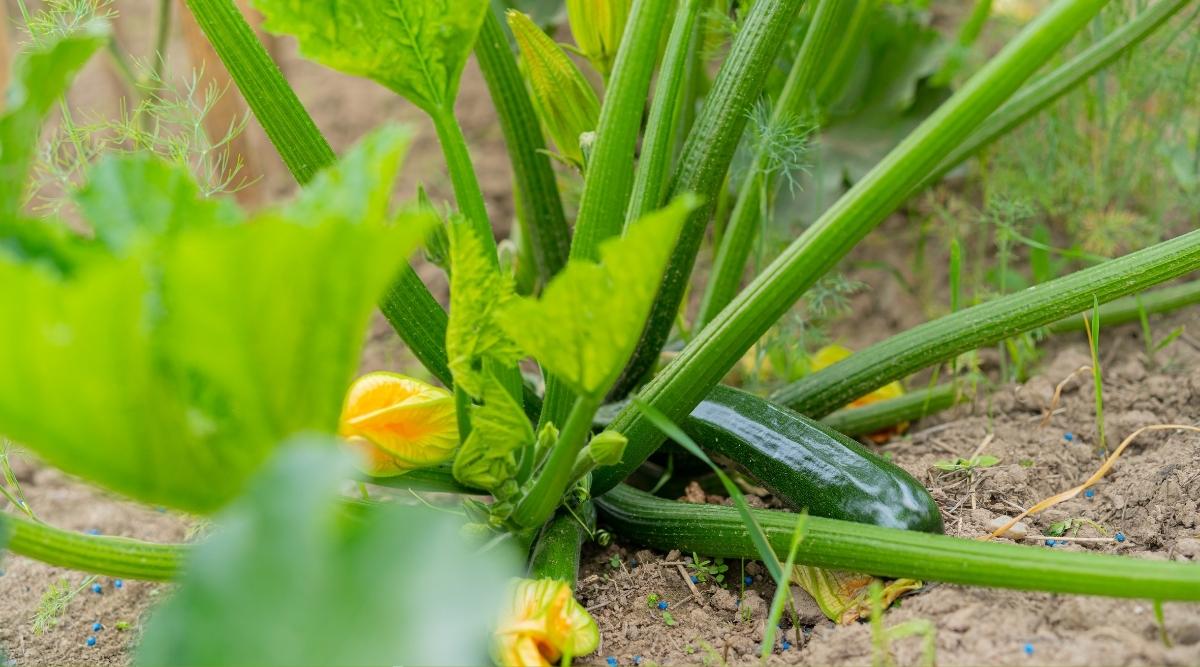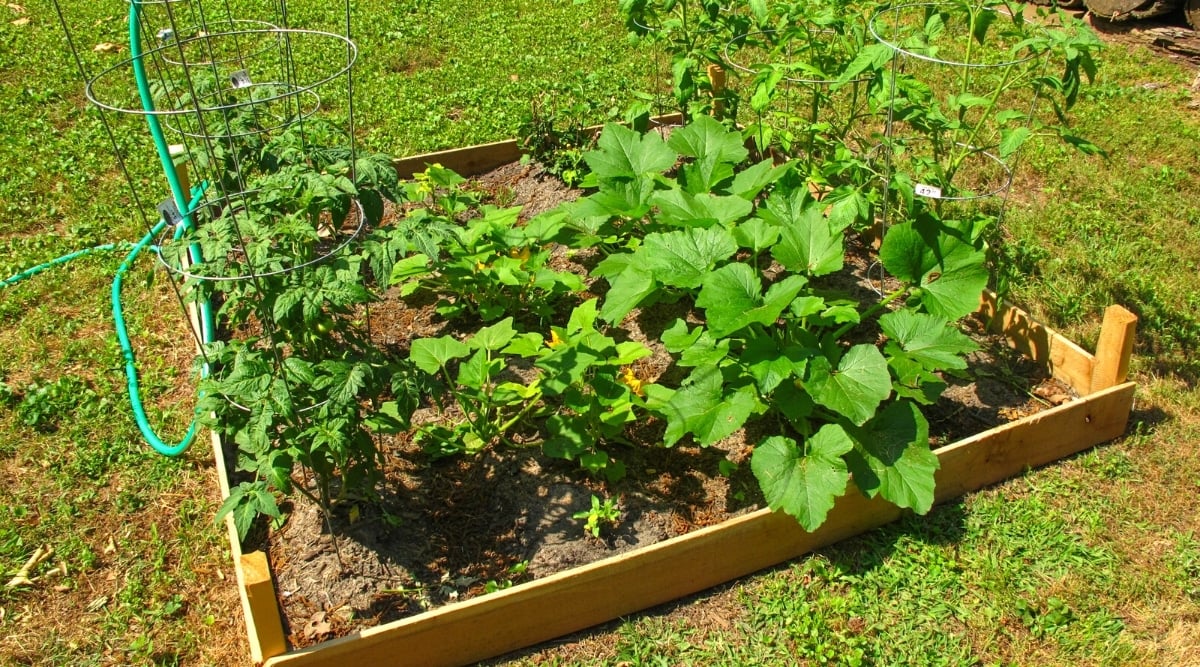As you start to plan your vegetable garden, you may be wondering how to arrange your plants this year. You probably want to grow a variety of tasty summer veggies, including tomatoes and zucchini. Can you plant these two together? Do they make good companion plants?
Gardeners have reliably used companion plantings for generations. Companion planting is the use of two or more different plants, that when grown together, benefit each other. Companion plants may help each other by providing shade, providing support, enriching the soil, attracting pollinators, or repelling pests. The “three sisters:” winter squash, corn, and beans, is a well-known companion planting arrangement.
Some plants actually should not be planted together. Sometimes plants may seem to have an adverse effect on each other. Two different plants may both be very heavy feeders and overly compete with each other for nutrients. A tall plant may shade out a smaller plant as they compete for light. Or two different plants may be highly susceptible to the same pests and diseases, thereby increasing the likelihood that both plants will become infected.
Other plants can be grown together in peaceful harmony without any noticeable benefits or problems. In a neutral situation like this, many plants can be grown together, as long as they aren’t overly competitive or directly causing each other harm. Let’s take a closer look at both tomatoes and zucchini to see how well they grow together.
The Short Answer
You can plant tomatoes with zucchini. They may not offer any overwhelmingly positive benefits to each other, although they can help each other in several small ways. More importantly, they won’t cause each other any harm. Both tomatoes and zucchini enjoy the same environmental growing conditions. Just be sure to give each plant enough space to grow and spread because they each need abundant sunlight and good airflow.
The Long Answer

Zucchini and tomatoes can be grown as close neighbors and will make satisfactory companion plants. Both vegetables thrive in the same environmental conditions, so a garden plot that is ideal for one plant is therefore ideal for the other.
They both need a location with full sun and benefit from nutrient-rich soil. Both vegetables need well-drained soil that is consistently moist throughout the growing season.
Zucchini and tomatoes offer each other some benefits. Zucchini has jumbo-sized leaves and acts like a ground cover. The leaves provide shade for the soil, helping prevent the soil from drying out. These large leaves will also help shade out weed growth. The flowers of both vegetables attract many pollinators, and these pollinators will benefit both species.
As you are planning your garden, there are other companion plants to consider growing nearby. You can plant multiple different species in the same raised bed, in the same row, or in neighboring rows.
Most of the companion plants in this list are beneficial because they repel pests, attract pollinators, or help enrich the soil.
| Tomato Companion Plants | Zucchini Companion Plants |
| Basil | Beans |
| Borage | Borage |
| Garlic | Dill |
| Nasturtium | Garlic |
| Onion | Mint |
| Parsley | Nasturtium |
| Sage | Oregano |
| Thyme | Peas |
Tomatoes

Tomatoes are an annual garden plant with delicious, rounded, juicy fruits. There are numerous hybrids and cultivars available, including small tomato varieties that are ideal for smaller containers and large, sprawling plants that produce vigorous harvests for almost the entire growing season.
Tomato fruits come in various shapes and colors, from bite-sized yellow pear-shaped fruits to giant meaty red-orange slicing tomatoes. If you love tomatoes, you can grow a rainbow assortment of delicious fruits!
Zucchini

Zucchini is a variety of summer squash that is perhaps best known for being long and green, and very prolific. But there are many more varieties of summer squash waiting to be discovered.
Summer squash may be small and white, large and green, flattened or oblong. Some are solid yellow, green, or white, while others are striped or patterned. All are tasty and easy to grow and have the same basic needs.
Timing of Planting

The timing of your planting is something to plan for. Both zucchini and tomatoes can be started from seed, but zucchini is best directly sown outdoors after the last frost, and tomatoes should be started indoors before the last frost. If you plan to purchase nursery-grown tomatoes, you will probably start with fairly small plants.
Once your zucchini seeds sprout, they will quickly develop big leaves. Make sure your tomatoes will have the necessary space and time to grow towards the sun before being shaded out by the zucchini.
Set your tomato plants in the ground before starting your zucchini seeds to give the tomatoes a head start. This also allows you to set up any tomato cages or other supports you need without the giant zucchini leaves getting in the way.
Gardening Style

Did you know that both zucchini and tomatoes can be grown in containers? That makes these plants highly versatile. You can garden on your back porch, from your fifth-floor balcony, or in a convenient spot anywhere in your yard.
You can grow these plants in large containers or have them in a more traditional garden setting. They also grow well in raised beds and rows. Unless you are growing compact, dwarf varieties, just remember that these plants both sprawl and will need a lot of space to grow.
Ideal Growing Conditions

Fortunately, both zucchini and tomatoes thrive in the same conditions, which makes them very easy to grow together. If you follow these basic guidelines for your plants, they should do well, whether you have them growing as neighbors or on opposite ends of your garden.
| Light | Full sun, ideally at least 8 hours of direct sunlight each day. |
| Water | These plants like consistent moisture. If there’s a dry spell, don’t wait too long to water your plants. Soil can dry briefly between waterings, but if the plants stay dry for too long, the leaves and fruits will suffer. Also don’t allow the roots of either vegetable to sit in wet or waterlogged soil. |
| Soil | Soil should be nutrient-rich and high in organic matter. Soil should also be loose and well-drained. Avoid heavy clay soil. |
| Nutrients | Add organic compost into the soil before planting. This will ensure your plants have a good source of nutrients to get them started. You can add a second round of compost or garden fertilizer just as your plants start fruiting. This can help them develop larger, more robust fruits. |
| Mulch | Mulch around your plants early in the season to help maintain and regulate soil moisture. |
| Space | Both vegetables each need plenty of space and good airflow. Unless you are growing dwarf varieties, both tomato and zucchini plants can occupy a lot of space. Allow at least 2 feet between plants so they have enough room to grow without crowding their neighbors. |
| Support | Zucchini doesn’t need support, but tomatoes will benefit from staking or using tomato cages. Install your support system while the plants are still small so you won’t need to damage any leaves while trying in install something after plants have significantly matured. |
| Season | Both tomatoes and zucchini are warm-season crops. They do best in warm weather and can be planted outside after the last spring frost. They will each die after the first fall frost. |
| Harvest | Tomatoes take anywhere from 60 to 100 days, or more, from seed to harvest. Zucchini takes an average of about 60 days to grow from seed to the first harvest. This means you will be harvesting your fruits from mid-summer into fall. Different varieties of plants will have slightly different ripening times. |
Common Pests

Fortunately, both vegetables don’t share too many garden pests. You should still keep an eye on your plants throughout the growing season, however. Catching any pest or disease early greatly increases your plant’s chances of recovery. Keep your plants well-spaced to improve air circulation and reduce favorable disease conditions.
One of the most common tomato pests is the tomato hornworm. This giant caterpillar happily eats the leaves of the tomato plant and can cause a great deal of damage. Keep an eye out for other pests, such as spider mites, aphids, and flea beetles.
There are also some common fungal diseases that can cause your plants to wither and die and cause fruits to develop mushy black spots.
Zucchini is highly prone to squash bugs and squash vine borers. Both of these insect pests can do a lot of damage in a very short time. Keep an eye out for aphids and flea beetles as well.
Zucchini can also develop fungal diseases that can wilt or kill the leaves and cause fruits to get moldy and rotten. Fungal diseases are most likely to occur in warm, high-humidity areas with poor airflow.
Final Thoughts
Now you’ve learned the basics about growing tomatoes and zucchini. Both of these delicious garden fruits are rewarding and easy to grow. Grow them together as companion plants, or incorporate them into other mixed gardening arrangements.
Get creative with your planting arrangements and don’t be afraid to try growing different plants together. Many plants act as beneficial companions and can be grown in close proximity. As long as you provide your plants with their preferred conditions and companions, they will reward you with a bountiful harvest.